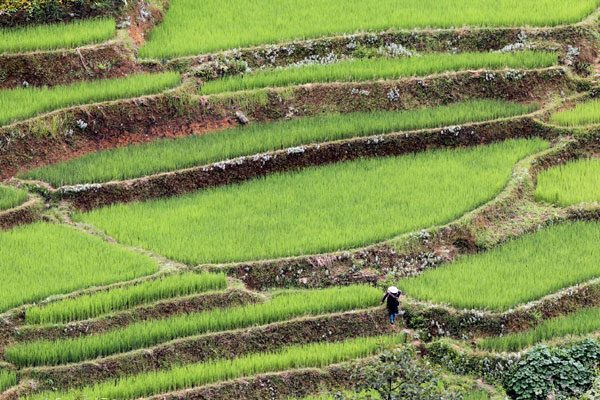Terraces on top of the world
Updated: 2013-07-26 06:35
By Hu Yongqi and Li Yingqing (China Daily)
|
|||||||||||
The addition of a site in Yunnan province to the World Heritage list is likely to guarantee the continuing survival of traditional Hani culture, as Hu Yongqi and Li Yingqing report from Honghe, Yunnan.
 |
|
A bird's eye view of Hani rice terraces in Yuanyang county, Yunnan province. [Photo by Zhang Wei/China Daily] |
Thick fog enveloped the mountains and hills in Xinjie township, Yuanyang county, on a morning in early July, a noted period of heavy rains in Yunnan province. When the wind blew, the Hani rice terraces dominated the view as they climbed one above the other, providing a picture-perfect example of traditional land layering.
Not far from the rice paddies, Li Zhengfu, 38, was one of many early birds up and about in Dayutang village at 7 am. As a member of the local catering industry, Li was busily preparing dishes for the tourists who would soon arrive in their droves.
His restaurant, located in his three-story home and subsidized by the local government, can serve traditional Hani cuisine to 120 people at each sitting. Li and his family can earn an annual net income of more than 40,000 yuan ($6,515), almost double the wage of a construction worker.
Fortune smiled on Li and the other residents of Yuanyang, the heartland of the Hani people, when the 1,300-year-old terraces were added to the UNESCO World Heritage List on June 22. The site is the first to be named after an ethnic group and brings the number of World Heritage sites in China to 45, second only to Italy.
Preservation is key
The Hani terraces have been superbly preserved in four counties of Honghe Hani and Yi autonomous prefecture, across an area of 160,000 hectares. In Yuanyang alone, 16,000 hectares feed 82 villages.
The prefecture government first applied to be added to the UNESCO list in 2001, and although the process took 12 years, the hard work finally paid off.
Before 2009, old-fashioned dirt roads made travel difficult and a lack of decent vantage points prevented visitors from getting a good view of the paddies, especially in autumn when the water reflects sunlight like a mirror.
At the time, the food in the local restaurants was of poor quality and conditions were less than sanitary. A dearth of decent hotels meant tourism was restricted to day trips and visitors were forced to return to the county seat in Nansha township at night. Unsurprisingly, the farmers who cultivated the terraces derived little benefit from tourism.
Related Stories
Leave a moment of peace for the Hani Terrace 2013-07-15 11:06
Hani terrace:a new World Heritage sitexia 2013-06-28 11:38
Stunning photos of Hani terrace 2013-06-26 16:13
Stunning photos of Hani terrace 2013-06-26 16:13
Hani terraces named UNESCO world heritage 2013-06-26 15:20
Hani terrace:a new World Heritage sitexia 2013-06-24 13:03
Today's Top News
Indictment shows CPC's stance on corruption
Japanese PM unlikely to visit Yasukuni Shrine
Top DPRK leader meets Chinese vice-president
FDI to maintain growth in H2
EU 'students' get access to Chinese culture
Girl, 2, thrown to ground; suspect detained
New industries lead job growth
Crackdown a bitter drug to herald changes
Hot Topics
Lunar probe , China growth forecasts, Emission rules get tougher, China seen through 'colored lens', International board,
Editor's Picks

|

|

|

|

|

|





